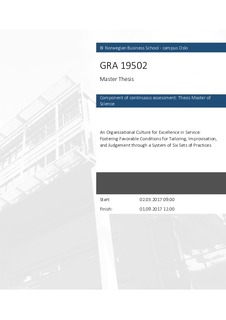An organizational culture for excellence in service: fostering favorable conditions for tailoring, improvisation, and judgement through a system of six sets of practices
Master thesis
Permanent lenke
http://hdl.handle.net/11250/2476666Utgivelsesdato
2017Metadata
Vis full innførselSamlinger
- Master of Science [1621]
Sammendrag
A growing body of theory and research applies a cultural perspective to the description
of organizational phenomena. We have designed the multiple case study in this thesis
report to contribute to this line of research by examining how the relationship between
organizational culture and excellence in service can be understood. Due to the human
intensive setting, a service organization has unpredictability at its core. Accordingly,
we define excellence in service as favorable tailoring, and successful use of
improvisation and judgement. Through in-depth interviews and observations, we
located practices of an organizational culture that enable these behaviors. Our findings
suggest that six sets of practices are vital in understanding the relationship between
organizational culture and excellence in service. These practices are: We Focus on the
Silver Lining: A Positive Mindset; We’ve got Each Other’s Backs: Physical and
Psychological Support; We Laugh a lot Together: Humor as a Nourishment and
Coping Mechanism; We Allow Tension to run High: Addressing Conflicts
Constructively; We’re Truly Present – in Body, Mind, and Heart: Physical and
Psychological Presence; and We’re Like Pieces in a Puzzle: A Sense of Belonging and
Contributing to Something Larger than Self. In isolation, the practices foster distinct
key enablers in each of the organizations that create favorable conditions for excellence
in service, namely learning, collaboration, and safety. Learning enables advantageous
judgment by expanding employees’ knowledge base. Collaboration ensures more
successful tailoring, as it provides a larger pool of personal and professional skills to
draw upon. Safety triggers improvisation by creating a secure environment where
organizational members can try out new ways to solve their tasks. By not identifying a
sole mechanism, but six sets of practices that enable tailoring, improvisation, and
judgement, we acknowledge that the practices work as a system. Each practice has
positive spin-off effects on the others, and this interconnectedness reinforces and
sustains the impact of organizational culture on excellence in service.
Beskrivelse
Masteroppgave(MSc) in Master of Science in Business, Leadership and Change - Handelshøyskolen BI, 2017
